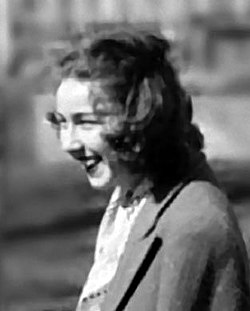Flannery O'Connor Quote
He said he had only a few days ago believed in blasphemy as the way to salvation, but that you couldn't even believe in that because then you were believing in something to blaspheme. As for the Jesus who was reported to have been born at Bethlehem and crucified on Calvary for man's sins, Haze said, He was too foul a notion for a sane person to carry in his head, and he picked up the boy's water bucket and bammed it on the concrete pavement to emphasize what he was saying.
Flannery O'Connor
He said he had only a few days ago believed in blasphemy as the way to salvation, but that you couldn't even believe in that because then you were believing in something to blaspheme. As for the Jesus who was reported to have been born at Bethlehem and crucified on Calvary for man's sins, Haze said, He was too foul a notion for a sane person to carry in his head, and he picked up the boy's water bucket and bammed it on the concrete pavement to emphasize what he was saying.
Related Quotes
Let my silence grow with noise as pregnant mothers grow with life. Let my silence permeate these walls as sunlight permeates a home. Let the silence rise from unwatered graves and craters left by bomb...
Kamand Kojouri
Tags:
abuse, abused, activism, activism poems, activist, amnesty, bellies, bombs, broken hearts, coming together
About Flannery O'Connor
Mary Flannery O'Connor (March 25, 1925 – August 3, 1964) was an American novelist, short story writer, and essayist. She wrote two novels and 31 short stories, as well as a number of reviews and commentaries.
O'Connor was a Southern writer who often wrote in a sardonic Southern Gothic style. She relied heavily on regional settings and grotesque characters, often in violent situations. In her writing, an unsentimental acceptance or rejection of the limitations, imperfections or differences of these characters (whether attributed to disability, race, crime, religion or sanity) typically underpins the drama.
O'Connor's writing often reflects her Catholic faith, and frequently examines questions of morality and ethics. Her posthumously compiled Complete Stories won the 1972 U.S. National Book Award for Fiction and has been the subject of enduring praise.
O'Connor was a Southern writer who often wrote in a sardonic Southern Gothic style. She relied heavily on regional settings and grotesque characters, often in violent situations. In her writing, an unsentimental acceptance or rejection of the limitations, imperfections or differences of these characters (whether attributed to disability, race, crime, religion or sanity) typically underpins the drama.
O'Connor's writing often reflects her Catholic faith, and frequently examines questions of morality and ethics. Her posthumously compiled Complete Stories won the 1972 U.S. National Book Award for Fiction and has been the subject of enduring praise.
